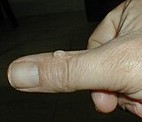Cervical Screening
Cervical Screening Awareness Week is running from 10th to 16th June 2019. Read on to find out why it is so important to attend your cervical screening appointment.

What is cervical screening for?
Cervical screening tests (also known as smear tests) check for cell changes on your cervix which are caused by high-risk human papillomavirus (HPV). These cell changes can help predict the risk of cervical cancer, which can affect even young women, and/or prevent its progression. HPV is a common virus which infects the skin and any moist membrane, in this case, the cervix. In most cases of HPV, your immune system will get rid of it and, as it does not usually have any symptoms, you may not even know you had it.
There are over 200 types of HPV and about 13 of these are linked to cervical cancer and are therefore called high-risk HPV. Cervical screening can find a high-risk HPV virus and any cell changes it has caused before it develops into cancer.
What happens during screening?
At The Walcote Practice, all of our cervical screening tests are carried out by our experienced GPs. Dr Sharon Rachman, our female doctor, is able to carry out these tests should you prefer.
During the appointment, you will be directed to a screened off area in which to remove the clothing from your lower body. You will be asked to lie back on the bed and given a blanket to cover yourself. When you tell the doctor that you are ready, they will enter the screened off area. Should you wish a chaperone to be present during this procedure, please tell us at the time of booking or during the appointment.
The doctor will ask you to bend your legs up with your knees apart. They will tell you when the test is about to start. First, they will gently put a new, clean plastic speculum into your vagina. This can be a little uncomfortable but should not be painful. The speculum will then be slowly opened until the doctor can see your cervix. The doctor will use a small, soft brush to quickly take a sample of your cervical cells – and that’s it, you are done! The speculum will be closed and removed, and the doctor will leave you in the private area to dress again.
Some women may experience very light bleeding after the test, so it is a good idea to wear a sanitary pad or panty-liner after the test.
The results will be ready in a day or two and your doctor will contact you with the results.
What else can I do to protect myself?
Whilst regular cervical screening is very important to ensure you have no abnormal cervical cells, there are additional ways to help yourself. Vaccines can help protect you against certain types of HPV which are linked to cervical cancer. The Walcote Practice offers the Gardasil 9 vaccine which protects against 7 high-risk HPV infections which may cause cervical cancer and also 2 common low-risk HPV infections which can cause genital warts. The cost is £145 per vaccine plus a £30 consultation fee. You will require 2-3 doses of the vaccination, depending upon your age.
If given at the right time (i.e. ideally but not necessarily prior to having sexual partners) this vaccine can prevent up to 90% of cervical and other HPV related cancers including throat and anal cancers.
Other ways to help to protect yourself include using condoms during sex (although this cannot always prevent infection because the virus is also spread through skin-to-skin contact of the wider genital area), and stopping smoking because smoking is known to damage cervical cells.
To book your cervical screening, a HPV vaccination consultation or any other appointment with our experienced GPs at The Walcote Practice, call us now on 01962 828175 or email info@thewalcotepractice.co.uk


